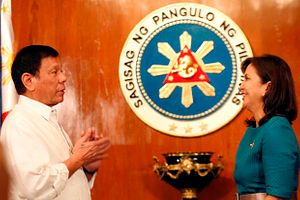A long-brewing war in the Philippines between President Rodrigo Duterte and Vice President Leni Robredo looked to be coming to a head last week over extrajudicial killings in the president’s war on drugs.
Under the Philippine constitution, presidents and vice presidents are elected separately, ostensibly allowing for stronger checks and balances but also setting the stage for political showdowns. Leni Robredo ran alongside failed Liberal candidate Mar Roxas — her win is still subject to dispute by runner-up Bongbong Marcos — and is one of the more high profile opposition figures. Comments made by Robredo last week in an interview with Reuters, however, has split the offices more starkly than at any point throughout the term.
Robredo said that the so-called war on drugs has primarily targeted the poor and suggested the bloody policy “is not working” given how many bodies continue to pile up. “We ask ourselves, ‘why is this still happening?’ The president has already made very serious threats to drug syndicates, to drug lords … and yet it’s still very prevalent, so obviously, it’s not working,” she said. She also called for the president to allow the United Nations to conduct an investigation, a call Duterte has railed against repeatedly.
The comments are a major talking point for detractors of the campaign. Human Rights Watch pegged the death toll at 22,983 by the end of 2018, but noted firm numbers are difficult to come by. The consistently rising figure alongside on the ground reporting shows Robredo, and the wider opposition to the conflict, are correct. But it’s not a conversation Duterte and his supporters are interested in entertaining.
Malacañang has responded in kind, offering Robredo a six-month stint in the cabinet as an anti-drug czar in a move widely read by detractors and Robredo herself as less than sincere. “The ball is in her court, a rare opportunity for a critic … to show her mettle,” presidential spokesman Salvador Panelo said of the offer earlier last week. “If she declines, it only shows that it’s not true that this war on drugs is a failure and that there should be other measures undertaken to stop it.”
Panelo raised the stakes last Thursday evening, reiterating the offer and reframing it as a gesture of goodwill. “Critics and detractors of this Administration describe the President’s gesture as a trap, arguing that it is impossible for VP Leni to solve the social problem with a limited period of six months and without the support of anti-drug bureaus and agencies,” Panelo said in a press conference. “We want VP Leni to succeed,” he added.
Robredo has not formally responded to the offers but has walked back on her original comments and blamed Reuters for “misquoting” her as well as other outlets for running misleading headlines. A Reuters spokesperson says the news agency stands by its reporting, saying it “fairly and accurately represented the statements.” In a radio interview earlier last week, she claimed she said rather than ending the anti-drug campaign it should be “tweaked” and “massaged” rather than ditched entirely. She has also made subsequent comments about how criticism directed against her is unfair in nature for various reasons, while some have also been speculating about how she would perform in the role if she were to take it.
The response of Malacañang and Robredo’s walk back reveal a barely-obscured uncomfortable truth about Duterte’s war on drugs and the surrounding rhetoric. The policy is immensely popular among Filipinos — and growing. Social Weather Stations polling conducted in July and released in September show a staggering 78 percent of respondents support the war on drugs.
While Robredo offers a more nuanced view on how the war should be conducted, an outright dismissal of the policy would be dangerous to her political future and possibly that of the opposition. Dueling with Bongbong Marcos continues, raising fears from the opposition that if the Supreme Court were to rule in his favor and open the door to a Vice President Bongbong, President Duterte would stand aside and hand the presidency to Ferdinand Marcos’ only son.
To be seen stamping on a domestically popular policy makes the case for Marcos stronger in the eyes of supporters and threatens to turn what is currently a slow-moving legal process into a fight for the future of the country.
Robredo will now be forced to navigate difficult waters. To take Duterte and his team up on the poisoned chalice offer will see a futile six months spent corralling law enforcement agencies with likely little success. Robredo and the broad opposition would then become responsible for any and all extrajudicial killings committed during that period. To not take up Malacañang’s offer she will be painted as weak, while the policy itself will be played as vindicated.

































